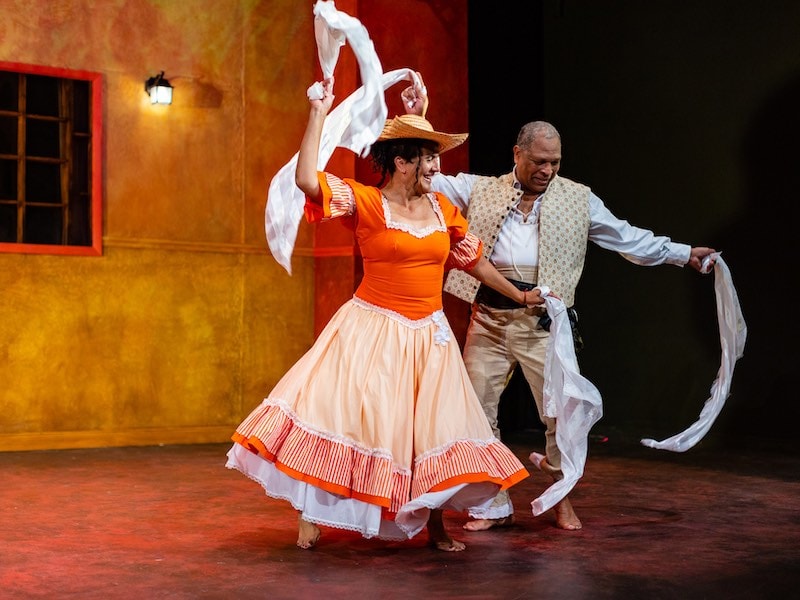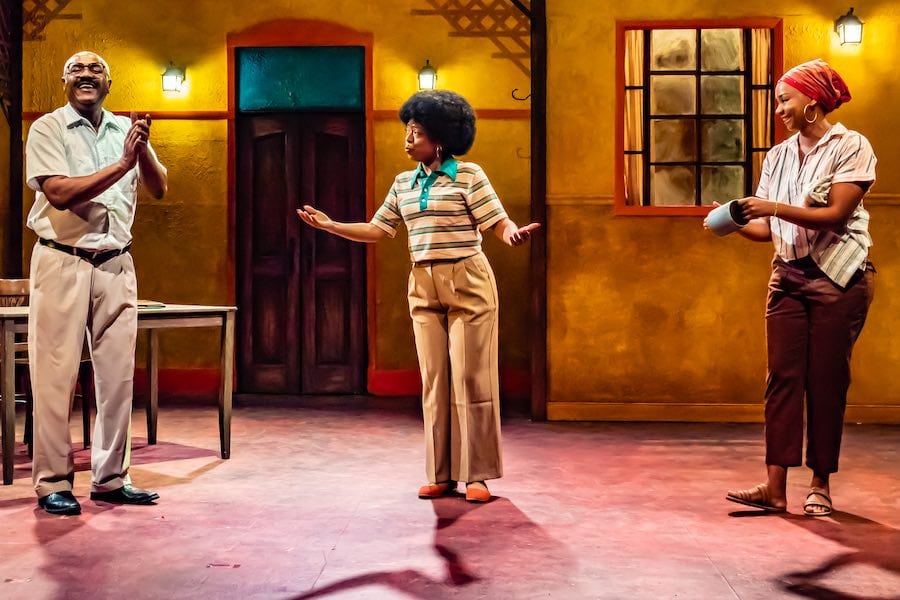This week GALA opened the final show of its 47th season with Kumanana! conceived and directed by co-founding Artistic Director Hugo Medrano. In his nearly 50 years at the helm of this important theater to DC’s landscape, Medrano and Co. have produced award-winning Broadway-style fare (In the Heights and this past season’s runaway hit that dominated the Helen Hayes Awards this year, the bio-musical On Your Feet), deep-hitting productions of poetic classics such as Lorca’s Yerma, and witty contemporary comedies by some of the most sparkling writers from Central and South America, with Medrano directing over 125 GALA productions himself. But perhaps his most iconic contribution has been the way Medrano has, from the company’s inception, pulled us all in together—familia—to witness and celebrate specific Latino stories and cultures, especially of those who have been marginalized. Billed as an Afro-Peruvian musical review, Kumanana! does not preen itself as high art but rather offers loose storytelling told through dance, poetry, and song from the heart.
Framing the evening is the story of two important figures in 20th-century Peruvian history, sister and brother Victoria and Nicomedes Santa Cruz. She a dancer-choreographer and he a poet together advanced Peruvian culture by holding up the very important identity, contributions, and struggles of Afro-descendants in Peru. Their intertwined stories show us definitively that racism is a universal scourge and that the struggles of Blacks to win justice and dignity, including the Civil Rights Movement of the 1950s and ’60s, had parallel tracks in both Peru and our own country.

In the first half of the evening, Anita González’s somewhat academically organized script introduces the main characters. The performer Marco Campos Olivares steps downstage embodying Nicomedes and opens the show with a reading of “Al compás del socabón,” one of the poet’s signature poems. The ensemble then explodes onto the stage to deliver undulating, joy-filled African choreography in “Zamba Malatò,” employing a vocabulary of movement that would be integrated so lusciously into Victoria’s contemporary dance style. The role of Victoria is divided between la voz cantada Victoria and the choreographer/dancer/teacher. It is not altogether a clear and satisfying choice, although Anaí Padilla Vásquez and Vicky Leyva (singing voice) both bring grace, beauty, and core character strength to their shared role.
The siblings’ stories dramatically came into focus with how the two struggled, as Black artists especially have done in so many situations: do they seize opportunities abroad to train and be seen and accepted on the “world stage” or do they try to contribute to and change from within their own communities?
Victoria went to Paris, the mecca that called so many in the first half of the 20th century, to soak up the air of artistic experimentation and certain freedoms. She studied with modern dance pioneer and superstar Katherine Dunham and built on this foundation to form her own aesthetic and company. Nicomedes stayed in Peru and was increasingly drawn into the roiling political and social upheaval of his country, and his writings reflected his society’s struggle. It first manifested in his search for identity, and one of the most powerful and dramatically sound scenes in the evening depicted Nicomedes’ inner struggle between the Catholic religion of his country and what he felt as the stronger, more authentic pull of his African ancestors’ spirituality.
Victoria returns to Peru, and an important pivot at the end of Act I shows how this family was reunited in the fight for social justice and equality. It is Victoria’s poem/song “Me gritaron, ¡negra!” (“Black!, They Yelled at Me”).
Act II focuses on how these two historic figures manifested both cultural and societal legacies, leaving an indelible blueprint on how those citizens of African descent must be seen as vital to an understanding of the strengths of Peruvian society.

Some of the best moments in the evening came when the ensemble members were allowed to cut loose and bring to life Victoria’s original choreography. I loved the street vendors’ scene, where the calls grew layered and rhythmically more complex and also melted emotionally in the sensuality of a courtship dance. There was a sensational number when the lithe, quicksilver dancer Omar Cru Navarro was engaged with the older dancer Luis Sandoval Zapata in a kind of dueling tap dance, and the setup suggested it wouldn’t even be a contest. Then, at the end, the senior dancer turned into a beast and schooled the younger man in sheer athleticism.
Kudos to the ensemble and to the trio of musicians — Manny Archiniega (Percussion), Roberto Arguedas (Guitar), and Gian Luiggi Cortez (Cajon) — who never flagged but kept us in the groove all evening. The designers collaborated to create a splendid whole aesthetic, especially Milagros Ponce de León’s scenic design, Luis García’s lighting design, and Hailey LaRoe’s projections.
We need to acknowledge the tragic loss of Director Medrano, who died little more than a week before opening. We must thank the Associate Director and Choreographer Luis Sandoval Zapata — indeed the whole company — for pushing through their pain in “the show must go on” triumph.
During the show and in its aftermath on Saturday night, when there were moving tributes paid to Hugo Medrano, there were fingers pointing heavenward and periodic spontaneous shouts out to GALA’s beloved leader. We all felt he was among us, there to guide us, but, as always in his vision, just beyond our reach. His patience, humor, gentleness, and emotional generosity were all evoked.
Could it really have been almost 50 years ago when in 1976, Hugo and his young bride settled in the neighborhood I now think of as the bilingual, Latino multicultural corridor of DC and started a theater company in their living room? And if Hugo was the visionary all along, then surely Rebecca has been the engine. It is unthinkable Rebecca can carry on without our full support in this most important legacy institution. ¡Viva Hugo!
Running Time: 90 minutes with a 15-minute intermission.
Kumanana! An Afro-Peruvian Musical Revue plays through June 25, 2023, at GALA Hispanic Theatre, 3333 14th Street NW, Washington, DC. Purchase tickets online. Regular tickets are $48 Thursday through Sunday. Senior (65+), military, and group (10+) tickets are $35; and student (under 25) tickets are $25. Noche de GALA tickets are $55 each. For more information, visit galatheatre.org or call (202) 234-7174. Tickets are also available on Goldstar and TodayTix.
In Spanish with English surtitles.
COVID Safety: There are three mask-required performances regardless of vaccination status: June 9, 11, and 15, 2023. For all other performances, the wearing of masks is optional IF you are fully vaccinated, pursuant to CDC guidelines, and have received an updated bivalent COVID-19 booster vaccine. See GALA’s complete COVID-19 Safety Policy.
Kumanana! An Afro-Peruvian Musical Revue
Hugo Medrano (Director/Play Conception), Luis Sandoval Zapata (Associate Director & Choreographer)
Featured cast: Marco Campos Olivares(Nicomedes Santa Cruz), Vicky Leyva (Vicky), Anaí Padilla Vásquez (Victoria Santa Cruz), Omar Cruz Navarro (Omar), Clara Chávez (Clara), Luis Sandoval Zapata (Lucho), and Karent Hinestroza (Karent)
Scenic Design by Milagros Ponce de León, Lighting Design by Luis García, Costume Design by Cidney Forkpah, Sound Design is by Justin Schmitz, Projections Design by Hailey LaRoe, Properties Design by Luke Hartwood, Alyssa Hill, Stage Manager, and Jon Townson, Technical Director, P. Vanessa Losada, Production Manager.




